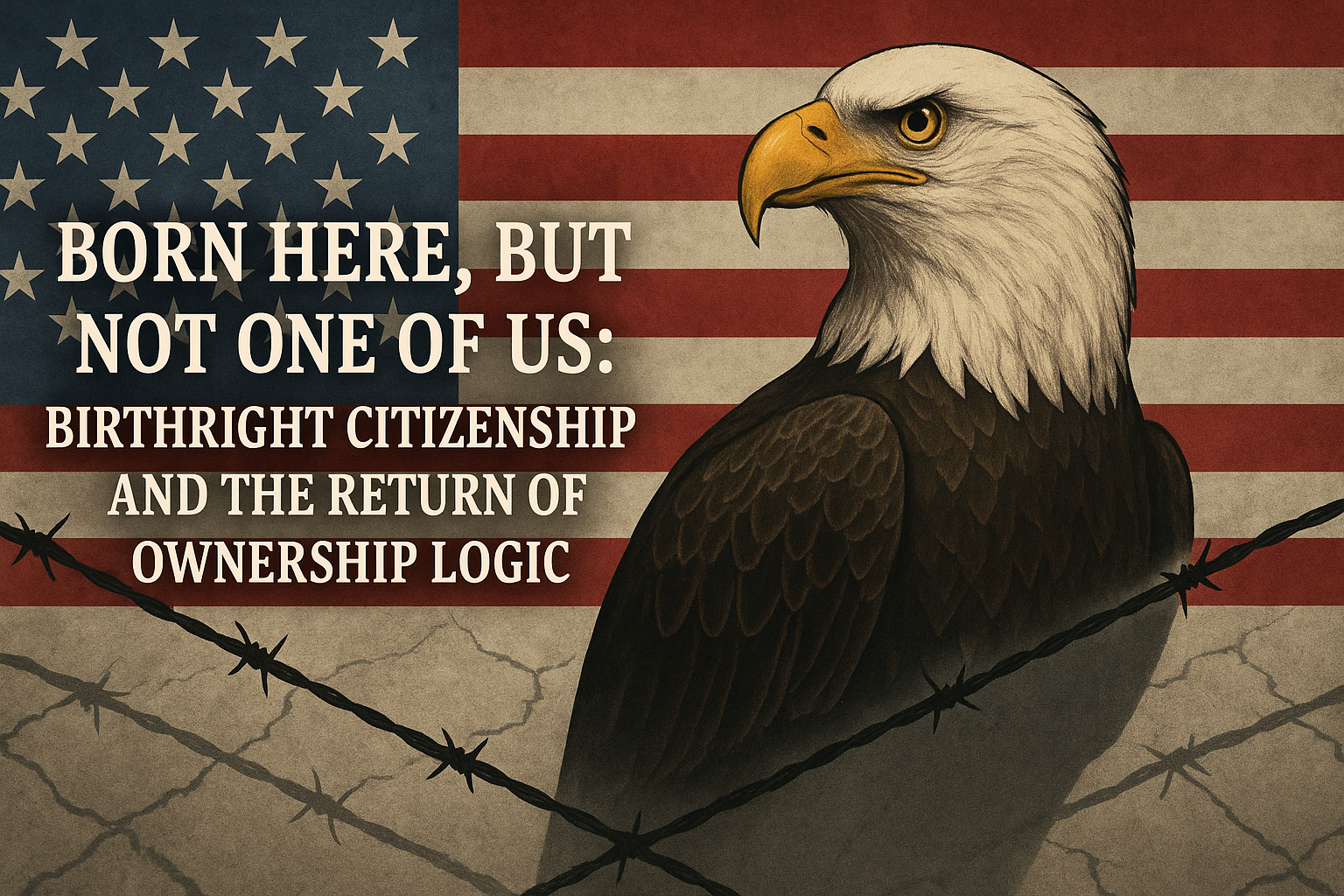Birthright Citizenship Fight, “Who Belongs,” and the Logic of Ownership
This brief is written from the position that human freedom is more fundamental than paperwork, borders, or property claims. The lens here is: people who were enslaved on U.S. soil overwhelmingly wanted to be free — not to be classified, sorted, or controlled. The question “who counts” has always been used by whoever holds power to decide who is protected and who is exploitable. We’re treating what’s happening right now as a continuation of that same pattern.
UPDATE What just happened
Tennessee Attorney General Jonathan Skrmetti has joined with attorneys general from Iowa and roughly two dozen other states to ask the U.S. Supreme Court to narrow birthright citizenship — specifically, to say that not everyone born in the United States should automatically be recognized as a U.S. citizen.
They’re filing in support of Donald Trump’s executive order “Protecting the Meaning and Value of American Citizenship,” signed January 20, 2025, which attempts to end automatic citizenship for certain children born in the U.S. if their parents don’t have what the state considers lawful, permanent status. This order was immediately challenged and has been blocked by multiple federal judges as unconstitutional under the Fourteenth Amendment.
This coalition of state AGs is telling the Supreme Court: the Citizenship Clause of the 14th Amendment has been read “too broadly,” and it should not apply to every baby born here. Their argument is that the original understanding after the Civil War tied citizenship to parental “domicile” and “allegiance,” not just being physically born on U.S. soil.
KEY ACTORS Who’s moving this
- Jonathan Skrmetti (Tennessee Attorney General) – leading / co-leading the multistate brief. He says automatic birthright citizenship for all “doesn’t square with the plain language of the Fourteenth Amendment.”
- Donald Trump (President) – issued Executive Order 14160 on Jan 20, 2025, to “protect” citizenship by restricting who gets it at birth. Lawsuits and injunctions hit immediately.
- Opposition coalition – multiple states, civil rights groups, counties. They argue this is unconstitutional, illegal, and would create a stateless subclass of U.S.-born kids. Federal courts in multiple states have blocked enforcement so far.
- United States Supreme Court – being asked to “clarify” the Citizenship Clause in a way that could rewrite how birthright citizenship has worked for 100+ years, especially since United States v. Wong Kim Ark (1898), which held that a child born in the U.S. to noncitizen parents is a citizen at birth.
LEGAL PLAY The argument being built
The Fourteenth Amendment says: “All persons born or naturalized in the United States, and subject to the jurisdiction thereof, are citizens…”
For over a century, courts have treated that as: if you’re born here, you’re in — with narrow exceptions (foreign diplomats, hostile occupying forces, some 19th-century tribal sovereignty cases).
The Tennessee / Iowa brief tries to reopen that using two angles:
- 1. Historical framing: They claim that “subject to the jurisdiction” originally excluded children born to people here without lawful status or without a settled allegiance to the U.S. So, they argue, those children were never meant to be automatic citizens. Courts, they say, “misinterpreted” this.
- 2. Trump’s order as vehicle: Executive Order 14160 is already in emergency litigation. The AGs are using it to say: this isn’t just politics — this is a live constitutional question the Supreme Court must answer.
- You can’t create a non-citizen class of newborns by executive order. That’s rewriting the Constitution from the White House. Multiple judges have already said no.
- Wong Kim Ark (1898) already says: born here = citizen, even if your parents aren’t citizens. Saying “only if your parents had the right paperwork” is a direct hit on that case.
- If the new reading wins, you instantly create U.S.-born kids with no citizenship anywhere. Civil rights groups say that manufactures a permanent “second tier.”
HUMAN REALITY Historical lens
This is where the stance matters.
In U.S. history, the question “Are you one of us?” has repeatedly been used to control labor, movement, and voice.
Enslaved Black people were literally treated as property in a system where landowners decided who counted as fully human. There was no “paper path” to respect. Freedom — not paperwork — was the priority.
After the Civil War, the 14th Amendment (1868) was written to slam that door shut by saying in plain language: if you’re born here, you are not property, you are not an exception, you are a citizen. It was built to keep former slave states from locking Black Americans in a non-person category forever.
The new AG brief is basically reopening that door from a different angle. Instead of saying “Black people aren’t citizens,” it’s: “Children of the wrong parents aren’t citizens.” Different target, same structure.
- We’ll accept your labor.
- We’ll accept your presence when it benefits us.
- But we reserve the right to deny you full belonging, full protection, full voice.
That logic is familiar. And dangerous. Because if you were enslaved, you were not fighting for who technically owned the dirt under your feet. You were fighting to not be owned at all.
The modern version of “you’re here, but you don’t count as one of us” echoes the same control instinct: classify people so they can be limited, contained, or threatened without full rights.
1Creation of a hereditary underclass
If a baby born in Tennessee on U.S. soil can be told “you’re not actually American,” that baby grows up with no guaranteed national identity, no guaranteed federal protections, and potentially no pathway to regular status. Civil rights groups warn that’s how you build a permanent labor pool with fewer rights. That’s not an accident — that’s design.
2State power vs. personhood
Tennessee’s AG is not just arguing law. He’s arguing identity. He’s saying the state can draw a harder border around who is “legitimate,” even at birth. Once the state can mark one newborn as “not real,” it can mark others. That should ring loud for anybody who studies Reconstruction-era rollbacks.
3Historical inversion
The 14th Amendment was born to end a caste system. This new push uses selective history from that same era to build a new caste system. That’s not just irony — that’s weaponizing Reconstruction language to undo Reconstruction’s core promise.
From an OSINT standpoint, this is not just an immigration case. It’s a test of whether the government can manufacture a class of people who are physically here but structurally “outside.”
To say it plainly:
People who were enslaved did not care which government claimed the
plantation. They cared about not being owned by anyone.
In 2025, when a state official argues that a child born here is physically here but doesn’t fully count, that is a softer version of ownership logic: we can define you, limit you, and decide how far your humanity travels under our law.
Citizenship is being treated like a gate, and the people holding the gate are openly trying to narrow it. The risk is obvious: once you normalize “born here but not one of us,” you can aim that rule at whoever you need next.

